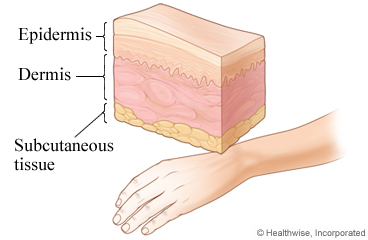
What does your skin do?
Your skin protects you from the environment around you. It helps keep infection and toxins out of your body. It also helps your body stay at a constant temperature.
Nerve endings in your skin make it possible to feel sensations, such as hot and cold or pain.
The skin has three layers:
- The epidermis, which is the layer you see.
- The dermis, which is below the epidermis.
- The subcutaneous tissue, which is below the dermis.
What problems can happen to your skin?
Skin problems include:
- Viral, fungal, and bacterial infections, such as cold sores, warts, shingles, boils, ringworm, and athlete's foot.
- Skin growths, such as moles, skin tags, and seborrheic keratoses. Skin tags are unsightly but harmless growths that show up in skin folds. Seborrheic keratoses are slightly raised tan spots that may look like warts but are almost always harmless.
- Conditions such as psoriasis, eczema, and rosacea.
- Psoriasis (say "suh-RY-uh-sus") is a long-term skin problem that causes thick, white, silvery, or red patches of skin.
- Eczema is a group of long-term skin problems that may cause itching, small bumps that look like blisters, and thickened and scaly skin.
- Rosacea (say "roh-ZAY-shuh") is a skin disease that causes redness and pimples on your nose, cheeks, chin, and forehead.
- Symptoms from food allergies, drug allergies, and other allergies. Symptoms include rashes and hives.
- Skin cancer, such as melanoma, basal cell cancer, and squamous cell cancer.
How can you prevent skin problems?
To help with dry skin:
- Shower or bathe in warm or lukewarm water. Wash your skin gently.
- Use a mild skin cleanser rather than soap. A skin cleanser can help protect your skin's natural moisture barrier.
- Pat your skin dry after a bath or shower. Apply a moisturizer right away.
- Apply moisturizer several times a day. Use moisturizer on your hands, especially if you must wear gloves often or if the air is dry where you live.
- Consider using a humidifier if the air inside your home is very dry. Follow the directions for cleaning the machine.
- Protect your lips with a lip balm that contains petroleum jelly or mineral oil.
To help with oily skin:
- Wash your face in the morning, in the evening, and after activities that cause you to sweat.
- Use a mild skin cleanser rather than soap.
- Avoid skin care products that contain oil, which may clog your pores. Instead, use water-based skin care products. Read the labels on products and look for the terms oil-free, hypoallergenic, and non-comedogenic.
- Apply a moisturizer daily.
To protect your skin from the sun:
- Try to stay out of the sun, especially from 10 a.m. to 4 p.m.
- Wear protective clothing, including a wide-brimmed hat, a long-sleeved shirt, and pants. Wear sunglasses that block ultraviolet (UV) rays.
- Use a broad-spectrum sunscreen that has a sun protection factor (SPF) of 30 or higher on any exposed skin.
- Don't use tanning booths and sunlamps. They can cause skin damage and may increase the risk of skin cancer.
For general skin health:
- Choose healthy foods. Eat a variety of healthy foods, like fruits, vegetables, whole grains, and lean protein.
- Do not smoke or allow others to smoke around you. The chemicals in cigarettes can make your skin age faster. If you need help quitting, talk to your doctor about stop-smoking programs and medicines. These can increase your chances of quitting for good.
- Manage stress. Stress can make some skin conditions worse.
Current as of: December 4, 2024
Author: Ignite Healthwise, LLC Staff
Clinical Review Board
All Ignite Healthwise, LLC education is reviewed by a team that includes physicians, nurses, advanced practitioners, registered dieticians, and other healthcare professionals.

